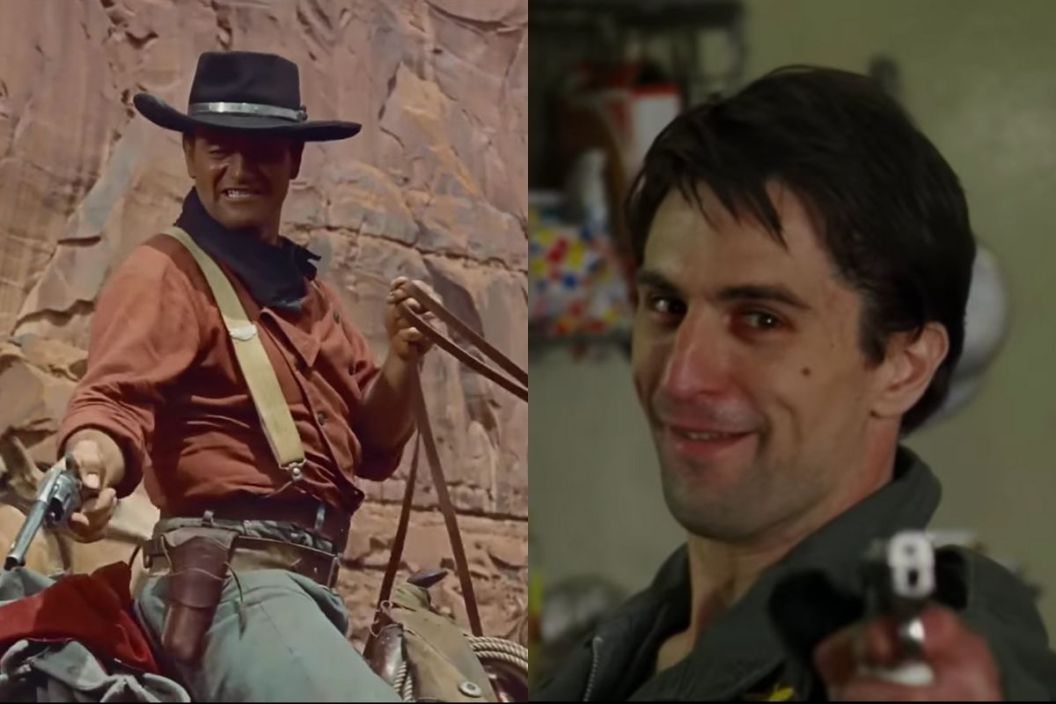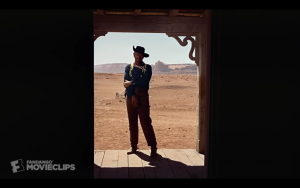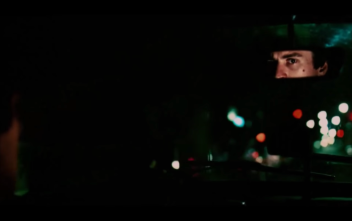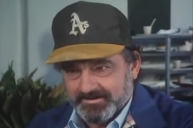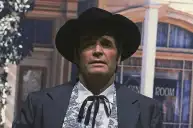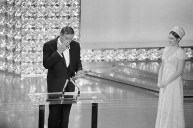When The Searchers premiered in 1956, John Ford's epic introduced a new kind of leading man. The picture starred John Wayne as Ethan Edwards and like the cowboys before him, Edwards was gruff and determined. But he was also, frankly, unlikable. Prone to racist rants and exaggerated shows of machismo, the former Confederate soldier was not the Wayne hero audiences were expecting. The Searchers was popular upon its release and in more recent decades, it's been heralded as one of the greatest films of all time. It's inspired not only the sprawling sub-genre of revisionist Westerns but influenced — quite directly — the archetypal antiheroes that dominate contemporary cinema. Among them, Travis Bickle: the sleazy protagonist of Martin Scorsese's Taxi Driver, played so indelibly by Robert De Niro.
'The Searchers'
The Searchers follows the story of Ethan Edwards (John Wayne), a hardened Civil War veteran on the search for his niece Debbie (Natalie Wood) after she is abducted by Native Americans. Over the course of the Texas-Indian wars, Edwards and his nephew travel for years, obsessively trying to locate Debbie. When they eventually do, they find she's been indoctrinated into the Comanche tribe. This incites Edwards' rage. If there's one thing to know about Ethan Edwards, it's that he hates Native Americans. He mutilates their corpses and even wants to kill Debbie for appearing as one.
Read More: What is a "Revisionist Western"?
Edwards' displays of utter racism, though not entirely off-brand for Wayne, represented a new shade in on-screen character development. He was so unkind, so brutal, that his flaws were compelling to viewers — especially in the whitewashed world of film in 1956. Although the director Ford was a pioneering figure in conventional Western filmmaking, The Searchers marked a surprisingly deeper engagement with Old West scruples. Wayne was still playing the hero, but cracks in that masculine identity were beginning to show. Movies that followed have offered comparably nuanced depictions of leading men, race, and Native American life.
At the end of The Searchers, Edwards and Martin standoff against the Comanches in a bitter battle. The chief, Scar, is killed and Edwards returns the resistant Debbie, finally, to her home. The last shot of The Searchers is iconic and emblematic: Edwards hovers in the family doorway before heading off into the sun, alone. "Ride Away" plays in the background.
Martin Scorsese on Watching 'The Searchers' For the First Time
In this rare interview, the director Martin Scorsese opens up about watching The Searchers for the first time when he was in eighth grade. At the time, Scorsese remembers how — emerging from the repression of the McCarthy era — many films were attempting to portray "the underbelly of the American psyche." The Man with the Golden Arm, The Big Knife Kiss Me Deadly, The Sweet Smell of Success, to name a few. But sitting there in the theater that day as an adolescent boy, Scorsese found The Searchers "absolutely terrifying." The character that John Wayne played was so unexpected: a lonely man acting out "the worst aspects of racism of our country." Watching Wayne, who was somewhat of a folk hero himself, inhabit such nasty ideals was "quite a shock" to the young Scorsese. Ethan Edwards showcased, expertly, the harmful impulses of our American identity coming out of the 1940s. "A poet of hatred," Scorsese calls Edwards — quite poetically.
'Taxi Driver'
The impact of characterization in The Searchers may seem obvious through the many outlaw films which followed: The Wild Bunch, Butch Cassidy and the Sundance Kid, and many, many Spaghetti Westerns. But what about stories set on the mean streets of New York City? In 1976, Martin Scorsese's Taxi Driver also unfolded from an antihero POV — with a psychological twist. According to many accounts, its main character Travis Bickle has Western roots. More specifically, the titular cabbie was modeled after John Wayne's character in The Searchers.
In 1975, the filmmaker Martin Scorsese enlisted screenwriter Paul Schrader to pen the Taxi Driver screenplay. Scorsese envisioned a tale that would induce the real-life haziness of falling in and out of sleep. This was easy for Schrader, who himself was battling chronic insomnia at the time. He finished the script in less than two weeks. Becoming reclusive during that period, Schrader has described the metaphor of a taxi cab appearing to him like a coffin: "That is what I was: this person in an iron box, a coffin, floating round the city, but seemingly alone."
A close-up from the final scene of Taxi Driver: Travis Bickle's agitated eyes.
So where does John Wayne come in? Well, according to the critic Roger Ebert — an unmatched source for all things film — Edwards' quest in The Searchers is mirrored (almost directly) in Schader's work. The hero in Taxi Driver, as well as in Schrader's other screenplay Hard Core, is "a loner driven to violence and madness by his mission to rescue a young white woman who has become the sexual prey of those seen as subhuman." Ebert explored this concept in his 2001 feature on The Searchers, which examined the film (one of his favorites) in a modern light. Ebert goes on:
"The Ethan Edwards story is stark and lonely, a portrait of obsession, and in it we can see Schrader's inspiration for Travis Bickle of Taxi Driver; the Comanche chief named Scar (Henry Brandon) is paralleled by Harvey Keitel's pimp named Sport, whose Western hat and long hair cause Travis to call him 'chief.' "
And Ebert is not the only one to note distinct parallels between The Searchers and Taxi Driver. Sub Natalie Wood for Jodie Foster and the frontier for porno theaters, and you've got two pretty similar movies! As the sought-out women in the center of conflict, both Wood and Foster's characters are indifferent to their predicaments. They don't want to be saved. Still, their projected purity becomes a stage for the grandeur of lost men, be they disillusioned (Edwards) or simply delusional (Bickle). Interestingly, these men are both vets. In the case of Taxi Driver, Bickle is a Vietnam War veteran who struggles with PTSD. Taxi Driver premiered while our country was still reeling from the failure of that war. Certainly, aspects of that sad cultural reckoning hearken back to Edwards' own Confederate past in The Searchers. Both former soldiers exhibit, quite literally, traits of psychosis that prevent them from achieving true human connection.
After the Museum of the Moving Image screened both films together in 2012, Politico published an article on the topic, entitled "See 'The Searchers,' and the making of Travis Bickle." In this piece, the cinephile Simon Abrams explains:
"Much has been made of the last scene of The Searchers, in which Edwards lingers outside and cannot bring himself to cross the threshold of his niece's front door. He's unable to rejoin the normative space of the home, and that's basically how things should be. He doesn't belong in a domestic setting, just as Bickle's bloody mission to rescue Jodie Foster's young prostitute [Iris] in Taxi Driver must inevitably end badly for him. There is no chance for redemption for either Edwards or Bickle, but just a faint hope that they can accomplish something good for someone else."
Plenty of other essays have been written comparing these movies. Both Taxi Driver and The Searchers are, after all, considered two great American films. And they accomplished similar missions in their respective eras. The Searchers may have looked like a typical '50s Western, but the conflict at hand departed from good guy-bad guy gunfighting tropes. In addition to offering John Wayne's best performance, the nuanced picture challenged our understanding of John Ford Westerns and signaled a changing of the tides. Similarly, in 1976, the success of Taxi Driver confirmed the rise of New Hollywood (or American New Wave Cinema) with Scorsese emerging as its foremost face: a director who wrestles with and occasionally revels in, the bitter violence of bad men.
